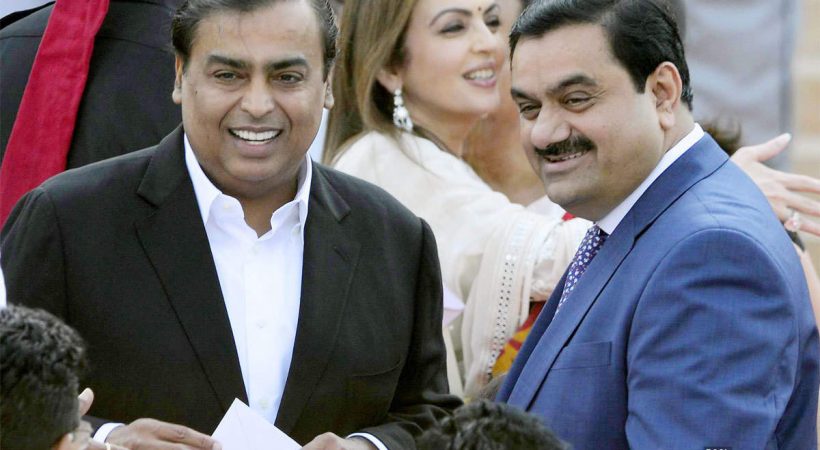India’s richest 1% have more than four-times the wealth held by 70% of the country’s population

63 Indian billionaires together are worth more than the total Union budget of 2018-19.
India’s richest 1 per cent hold more than four-times the wealth held by 953 million people who make up for the bottom 70 per cent of the country’s population, while the total wealth of all Indian billionaires is more than the full-year budget, said a report in Huff post India by Press Trust of India (PTI) quoting a study by the reputed rights group Oxfam.
The study ‘Time to Care’ was released in Davos on Monday prior to the 50th Annual Meeting of the World Economic Forum (WEF).
The rights group Oxfam also said the world’s 2,153 billionaires have more wealth than the 4.6 billion people who make up 60 per cent of the planet’s population, PTI said.
The Oxfam report flagged that global inequality is shockingly entrenched and vast and the number of billionaires has doubled in the last decade, despite their combined wealth having declined in the last year, PTI said.
“The gap between rich and poor can’t be resolved without deliberate inequality-busting policies, and too few governments are committed to these,” said Oxfam India CEO Amitabh Behar, who is in Davos to represent the Oxfam confederation this year, PTI said.
The Oxfam report said that the combined total wealth of 63 Indian billionaires is higher than the total Union Budget of India for the fiscal year 2018-19 which was at Rs 24,42,200 crore.
“Our broken economies are lining the pockets of billionaires and big business at the expense of ordinary men and women. No wonder people are starting to question whether billionaires should even exist,” Behar said.
The issues of income and gender inequality are expected to figure prominently in discussions at the five-day summit of the WEF, which started on Monday.
The Oxfam report further said “sexist” economies are fuelling the inequality crisis by enabling a wealthy elite to accumulate vast fortunes at the expense of ordinary people and particularly poor women and girls.
As per the report, it would take a female domestic worker 22,277 years to earn what a top CEO of a technology company makes in one year, PTI said.
With earnings pegged at Rs 106 per second, a tech CEO would make more in 10 minutes than what a domestic worker would make in one year.
It further said women and girls put in 3.26 billion hours of unpaid care work each and every day ― a contribution to the Indian economy of at least Rs 19 lakh crore a year, which is 20 times the entire education budget of India in 2019 (Rs 93,000 crore).
Behar said women and girls are among those who benefit the least from today’s economic system.
“They spend billions of hours cooking, cleaning and caring for children and the elderly. Unpaid care work is the ‘hidden engine’ that keeps the wheels of our economies, businesses and societies moving.PTI reported.
Oxfam said governments are massively under-taxing the wealthiest individuals and corporations and failing to collect revenues that could help lift the responsibility of care from women and tackle poverty and inequality.
Besides, the governments are also underfunding vital public services and infrastructure that could help reduce women and girls’ workload, the report said.
As per the global survey, the 22 richest men in the world have more wealth than all the women in Africa.
Besides, women and girls put in 12.5 billion hours of unpaid care work each and every day ― a contribution to the global economy of at least USD 10.8 trillion a year, more than three times the size of the global tech industry.
Getting the richest one per cent to pay just 0.5 per cent extra tax on their wealth over the next 10 years would equal the investment needed to create 117 million jobs in sectors such as elderly and childcare, education and health.
Governments must prioritise care as being as important as all other sectors in order to build more human economies that work for everyone, not just a fortunate few, Behar said.
Oxfam said its calculations are based on the latest data sources available, including from the Credit Suisse Research Institute’s Global Wealth Databook 2019 and Forbes’ 2019 Billionaires List, PTI reported.















